Ron DeSantis: Understanding the Florida governor’s impact on the Black community
Learn all about Ron DeSantis, the current governor of Florida

Ron DeSantis is the 46th governor of Florida and is known for his conservative values and support of President Donald Trump. He was elected governor in November 2018 and took office on January 8, 2019. Let’s take a closer look at Ron DeSantis’ background and his impact on the Black community, especially as he rises in prominence on the national Republican stage.
Who is Ron DeSantis?
Early Life and Education
Ron DeSantis was born in Jacksonville, Florida, on September 14th, 1978. His parents are Ronald Daniel DeSantis and Karen DeSantis. DeSantis’ father installed Nielsen TV rating boxes, while his mother worked as a nurse.
DeSantis attended Dunedin Highschool before later enrolling at Yale University for his undergraduate degree. At Yale, he majored in history and political science and graduated cum laude in 2001.
After Yale, he spent a year coaching and teaching history at Georgia’s Darlington School. He then went on to earn his law degree from Harvard Law School in 2005.
DeSantis’ Political Career
Ron DeSantis began his political career in 2012 after winning a seat in the US House of Representatives representing Florida’s 6th Congressional District. While in office, he focused on issues such as abortion, gun control, securing U.S.-Mexico border laws and reducing government spending. He was re-elected for a second term to the House of Representatives in 2014 and for a third term in 2016.
DeSantis declared his campaign for Florida’s U.S. Senate seat in May 2015. At the time, Marco Rubio had chosen not to file for reelection because he was also running for president of the United States. DeSantis withdrew from the Senate contest and ran for reelection to the House when Rubio halted his presidential campaign and instead decided to run for reelection to the Senate.

Donald Trump was elected president in 2016, and DeSantis was one of his most ardent supporters. He backed Trump’s expansive tax reform measure and the failed attempt to repeal the Patient Protection and Affordable Care Act in Trump’s first year as president.
DeSantis announced his intention to run for governor of Florida and won the Republican primary in 2018 after a public endorsement from Donald Trump. He then went on to win the general election in November 2018, becoming the 46th governor of Florida. He was re-elected in 2022.
Immediately after taking office in 2019, DeSantis’ controversial policies garnered widespread attention. One of the most notable ones is when he lifted restrictions considerably sooner than other governors during the COVID-19 pandemic in 2020.
He spearheaded the enactment of the Parental Rights in Education Act in 2022, which curbed discussions on gender identity and sexual orientation in public schools. Its detractors dubbed it the “Don’t Say Gay” bill. Disney, one of the biggest employers in the state, eventually released a statement against the legislation. In retaliation, DeSantis took away the company’s tax benefits and position as a self-governing entity.
Influence in the Republican Party
Ron DeSantis has continued to gain status as a leader among conservative Republicans. He was often praised for his strong support of President Trump’s agenda, including tighter immigration laws and economic policies. He was one of the few governors in the U.S. who complied with Trump’s request to send National Guard troops to protect federal buildings from protesters in 2020.
He has also been a vocal critic of Democratic policies, including the Biden administration’s legislation on immigration reform and its push for green energy initiatives. He has argued that such laws would make it harder for American citizens to find jobs as more immigrants take available positions.
DeSantis is known as a proponent of the Second Amendment and has staunchly opposed any attempts to make gun control measures stricter in Florida. He has also been critical of the Chinese Communist Party, believing that its actions have posed a threat to global stability and economic growth.
Personal Life
Ron DeSantis is married to Casey Black, a former news reporter. Together, they have three children: Madison, Mason and Mamie.
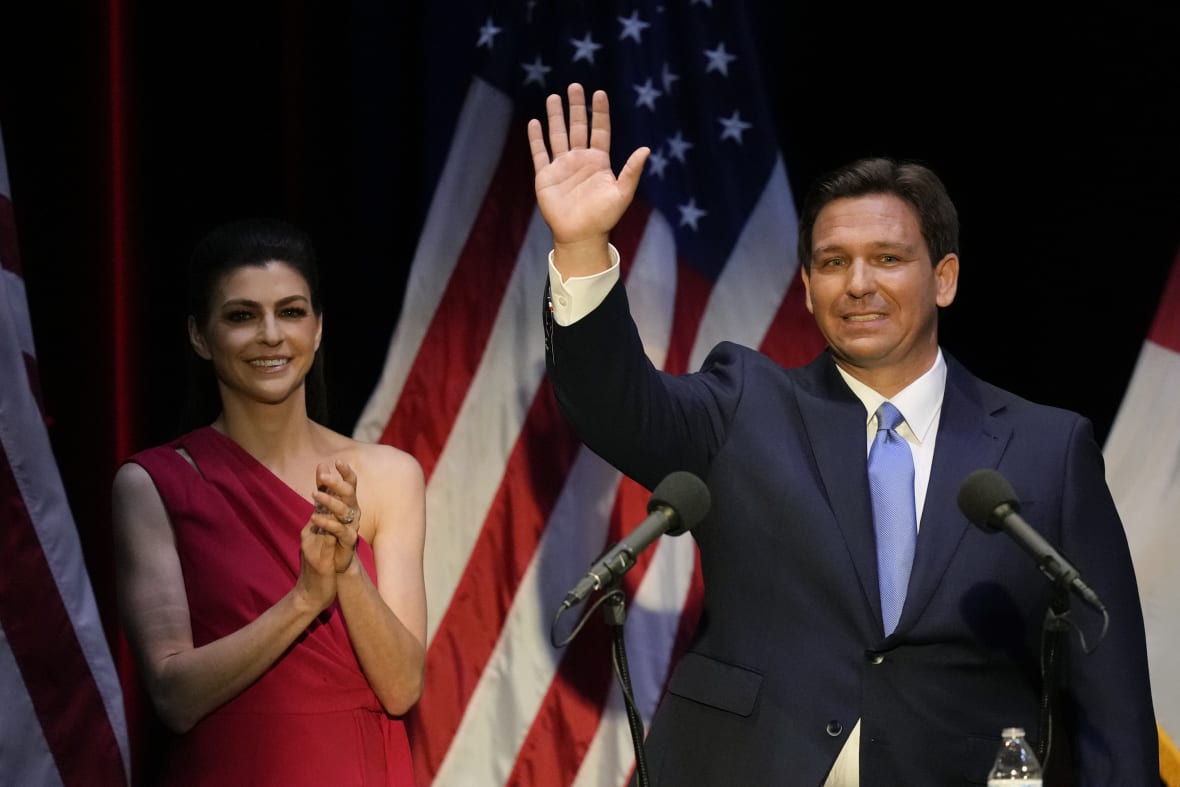
Key laws Ron DeSantis has passed/blocked
Abortion
After the Dobbs ruling by the United States Supreme Court, DeSantis vowed to “expand pro-life protections.” On April 14, 2022, he signed a bill that limits elective abortions to 15 months of pregnancy, down from 24 weeks.
The law covers exceptions that allow termination of a viable pregnancy after 15 weeks if, at minimum, two doctors certify that doing so is essential to avoid a “serious risk” to the mother’s physical health or if the fetus seems to have a “fatal fetal abnormality.” It, however, excludes incest, rape, mental health, and human trafficking from these exceptions.
The bill was set to take effect on July 1, but a state judge stopped it from doing so after declaring that the law was unconstitutional because Florida’s constitution protects the right to privacy. The law still took effect on July 5, pending review after DeSantis challenged the decision.
Education
DeSantis spearheaded an initiative to restrict the instruction of critical race theory in Florida’s public schools in June 2021. According to him, critical race theory teaches school children to loathe their country, a sentiment echoed by others on the right.
The ban was authorized on June 10 by the Florida Board of Education. The Board was accused of seeking to withhold information from kids by the Florida Education Association, which protested the restriction. Several opponents of the prohibition claimed that DeSantis was politicizing the American education system and that the ban would have the effect of whitewashing history for students.
DeSantis introduced the Stop Wrongs to Our Kids and Employees (WOKE) Act on December 15, 2021, which he said would enable parents to sue school districts that teach their kids critical race theory. The purpose of the bill was to prohibit teaching that could lead anyone to believe they “bear responsibility” for historical wrongdoings owing to their gender, race, or national origin as well as education that focuses on teaching that people are “inherently racist, sexist, or oppressive, whether consciously or unconsciously.”
The bill addresses what DeSantis has called “political indoctrination” in Florida schools and businesses. A Florida judge blocked the act on August 18, 2022, stating that it was overly ambiguous in its wording and was in violation of the First Amendment.
Ron DeSantis’s Department of Education also rejected the Advanced Placement African-American History course in Florida. Shortly after he raised a fuss, the College Board announced that its course would be putting less focus on parts of the curriculum that DeSantis and others objected to.
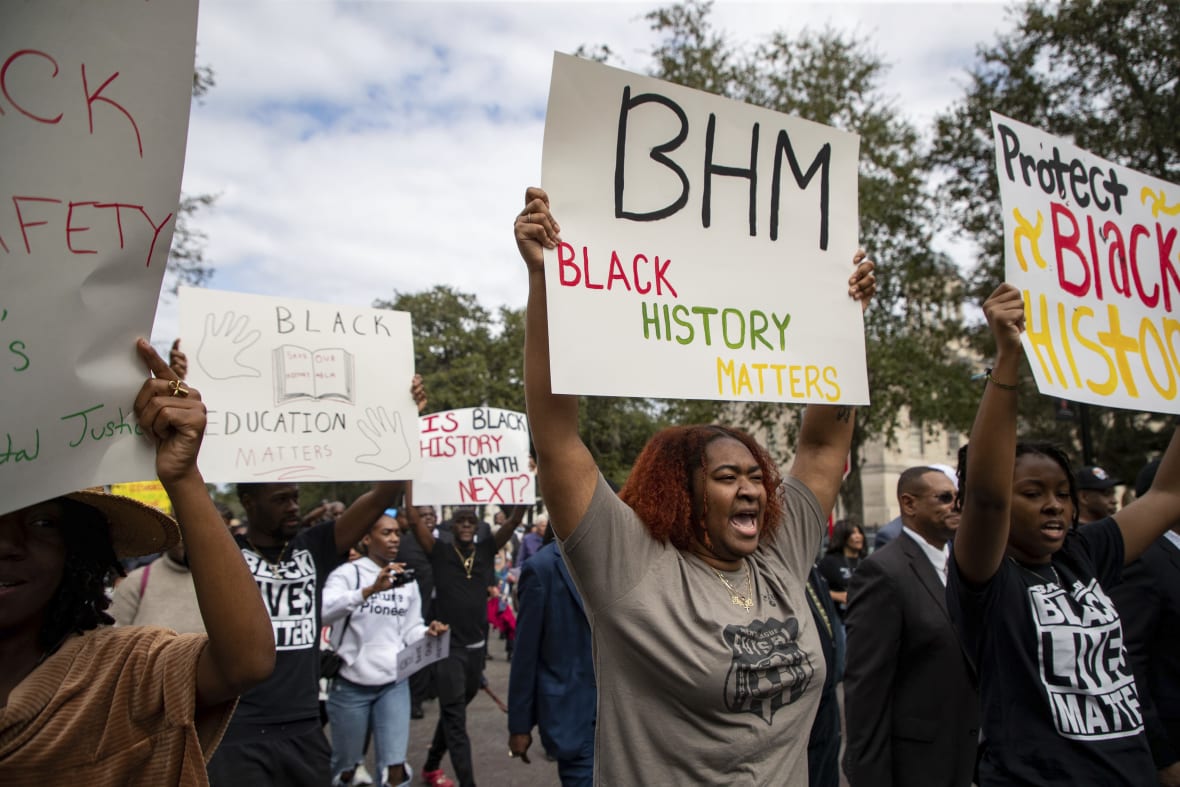
Immigration
Ron DeSantis was against the Deferred Action for Parents of Americans (DAPA) and Deferred Action for Childhood Arrivals (DACA) programs and criticized Obama’s enforcement of immigration laws. While in Congress, he was a co-sponsor of Kate’s Law, also referred to as the “Establishing Mandatory Minimums for Illegal Reentry Act of 2015.” This law would alter the Immigration and Nationality Act to toughen the penalties for foreigners who illegally return the country after being deported.
As governor, DeSantis also urged Florida sheriffs to work more closely with the federal government on matters relating to immigration. He approved a law opposed to “sanctuary cities” in June 2019. Prior to the law’s passage, Florida had no sanctuary cities, and those who support immigration criticized the bill as being politically-driven.
Gun Laws
Ron DeSantis opposes stricter restrictions on guns. In November 2020, DeSantis suggested a “anti-mob” amendment to Florida’s longstanding “Stand Your Ground” statute. This allows gun-owning citizens to use lethal force against anyone they suspect of looting or otherwise threatening businesses. Additionally, it would redefine “burglary” as occurring within 500 feet of “violent or disruptive gatherings.”
LGBTQ
In February 2022, Ron DeSantis declared support for the Florida Parental Rights in Education Act. The bill’s opponents have dubbed it the “Don’t Say Gay” law, as it forbids teaching about gender identity or sexual orientation in Kindergarten through third grade. He ultimately signed House Bill 1557 on March 28, 2022, and it became law on July 1.
The Walt Disney Company was openly resistant to the bill after many Disney employees took to social media to protest it. After a public dispute between Disney and DeSantis, the governor proposed that the Florida legislature rescind Walt Disney World’s self-governing privileges over its land. On April 22, 2022, he approved a bill that, by June 2023, would abolish the Reedy Creek Improvement Act, which has permitted Disney to self-govern in the district since 1967.
Potential presidential bid in 2024
Ron DeSantis has received a lot of attention from those in political circles speculating about the upcoming 2024 presidential election, even though former President Donald Trump is the most well-known contender to have declared a bid for the White House in 2024. DeSantis is currently preparing the foundation for a run for president but has not officially declared his candidacy.
According to The Washington Post, DeSantis’ political staff has already identified potential campaign recruits in states like New Hampshire and Iowa, whose customarily early placements in the nomination process give them an outsized impact on the race.
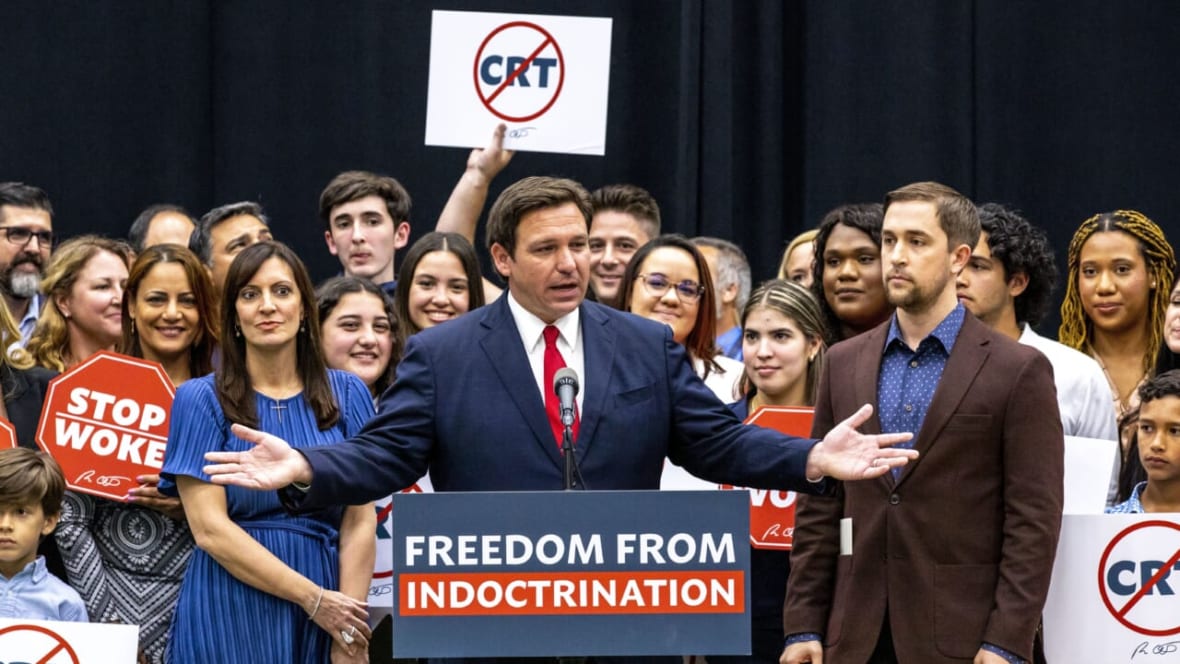
The paper reported that DeSantis was in direct contact with two senior members of his present team, Generra Peck and Phil Cox, about potential key roles in any 2024 campaign, citing two Republican sources with information about conversations and staff meetings on DeSantis team.
Former President Donald Trump has also seen DeSantis making moves and has given credence to rumors that DeSantis could be a contender in the race by directly attacking DeSantis. While also criticizing DeSantis’s behavior during the Covid-19 pandemic, Trump stated, “Ron would have not been governor if it wasn’t for me…. When I hear he might run, I consider that very disloyal.”
DeSantis and the Black community
Campaign-related accusations of racism
During his campaign for governor of Florida in 2018, Ron DeSantis released an ad that some felt was racially-charged. In the ad, he said, “The last thing we need to do is monkey this up by trying to embrace a socialist agenda with huge tax increases and bankrupting the state.” The phrase was met with immediate outcry, especially as his opponent in the race, Andrew Gillum, was Black.
DeSantis denied accusations of racism in an interview with Fox News, but his comments sparked racial tensions that had been simmering in Florida for many years.
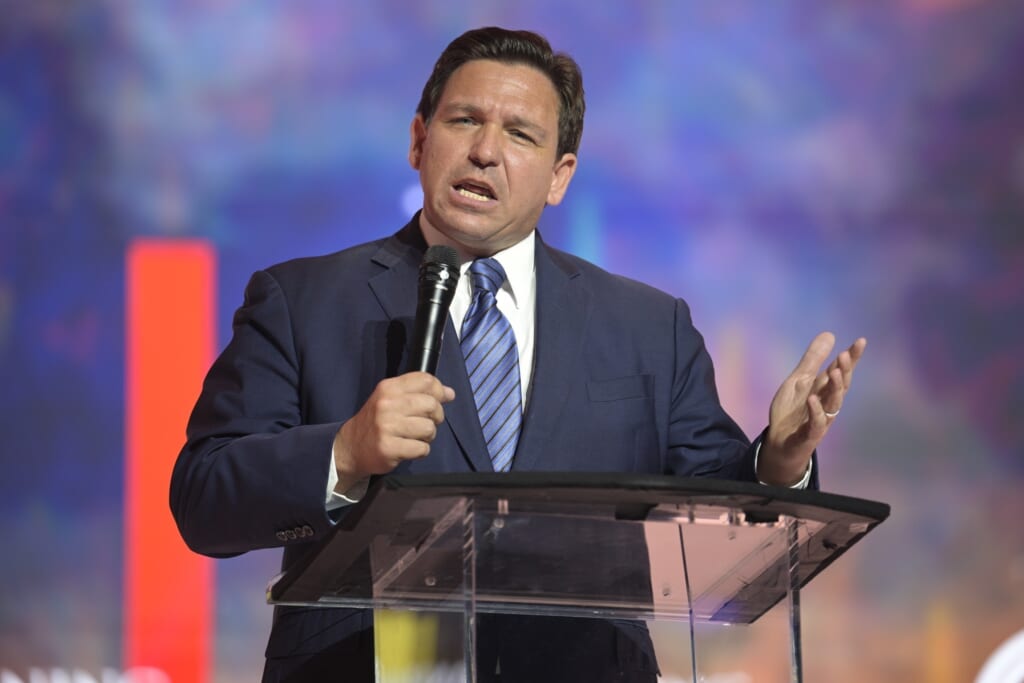
In 2018, Ron DeSantis was revealed to have accepted a significant amount of money for his campaign from a donor who called former President Obama the N-word in a now-deleted tweet. After news of this broke, DeSantis’ office said he wouldn’t take any more of the donor’s money, but he also admitted that he would not be returning the money already given, either.
Controversial policies
DeSantis and his administration have often been accused of racism for their decisions and policies, especially those that disproportionately affect Black communities. His support for the “Stand Your Ground” law in Florida, which states that an individual can use deadly force when faced with a life-threatening situation, has been particularly controversial, because several cases have shown it being used to justify shooting unarmed African-Americans.
DeSantis has supported private school vouchers, which have the potentially disastrous effect of defunding public school systems in lower-income African American communities. And he has consistently opposed Medicaid expansion efforts, which would have had a hugely beneficial effect on the Black community as well as other low-income households.
In 2021, DeSantis signed a bill with sweeping anti-riot measures into law that many saw as targeting peaceful protests by Black Lives Matter activists, who have made significant strides in raising awareness about racial injustice.
Voting Rights
In 2022, a congressional map approved by DeSantis and drawn by his staff was deemed unconstitutional for breaking up a majority-Black district. This decision was made as part of an ongoing legal battle between the Republican-led state legislature and voting rights activists.
The ruling by the federal court was seen as a victory for voting rights advocates, who argued that the map approved by DeSantis sought to limit African-American representation in Congress and that Florida’s districts were unfairly drawn to give Republicans an advantage. The court found that the map violated the Voting Rights Act of 1965, which protects against racial discrimination in elections, and ordered Florida to redraw its congressional districts.
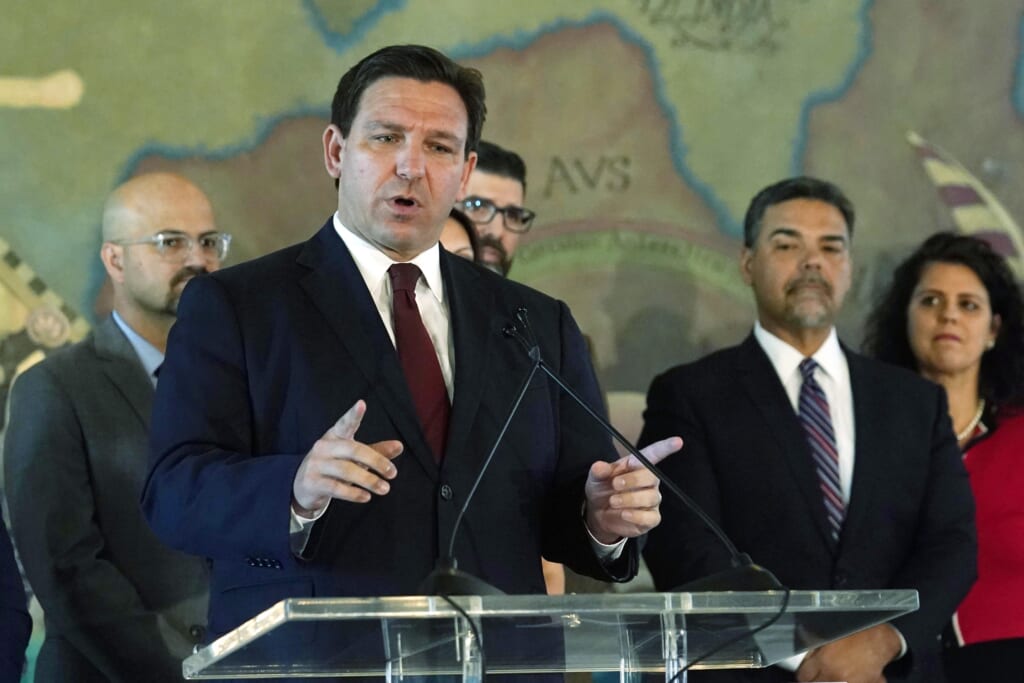
Police Reform
DeSantis has been criticized for his lack of support for the Black community, but he has also taken some steps to address racism in the state. In 2020, DeSantis signed a bill that mandated statewide police reforms, such as setting guidelines for the use of force and requiring officers to undergo implicit bias training.
By understanding what DeSantis’ stances are on issues that affect Black communities, we can better recognize when his policies may be actively working against our interests while also identifying where we can work to create changes that will benefit us. Ultimately, Black people need to stay informed about the politics of their state in order to advocate for policies that will help our communities effectively.
The Bottom Line
Ron DeSantis has had a tumultuous tenure as the governor of Florida. His policies have been controversial, from his handling of the COVID-19 crisis to his expansive anti-riot measures. But his most lasting legacy may be the racial tension that has been exacerbated by his lack of support for the Black community.
His policies have been seen as further marginalizing this community, and his comments in 2018 turned up the heat on a long-simmering racial tension in the state. As DeSantis continues to serve as governor and to potentially run for the presidency in 2024, it remains to be seen how his policies will affect not only the Black community but all of Florida.
More About:Politics









